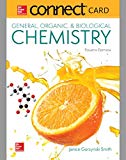
(a)
Interpretation:
From the given compounds from E to H, a compound containing a primary amine and a primary amide needs to be identified.
Concept Introduction:
Amine − is an organic N compounds formed by replacing one or more H atoms of
Amide- is an organic compound contains the group of
Answer to Problem 31P
Structure H.
Explanation of Solution
Amines are formed by replacing one or more hydrogen atoms of ammonia with alkyl groups.
Furthermore,
In the below structure, bond that is indicated in red color is the single
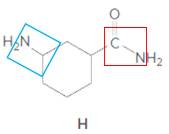
Hence, structure H is a compound that contains a
(b)
Interpretation:
From the given compounds from E to H, a compound containing a primary amine and a secondary amide needs to be identified.
Concept Introduction:
Amine − is an organic N compounds formed by replacing one or more H atoms of
Amide- is an organic compound contains the group of
Answer to Problem 31P
Structure F.
Explanation of Solution
Amines are formed by replacing one or more hydrogen atoms of ammonia with alkyl groups.
Furthermore,
In the below structure, bonds that are indicated in red color are the two
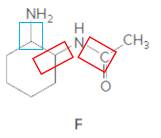
Hence, structure F is a compound that contains a
(c)
Interpretation:
From the given compounds from E to H, a compound containing a secondary amine and a tertiary amide needs to be identified.
Concept Introduction:
Amine − is an organic N compounds formed by replacing one or more H atoms of
Amide- is an organic compound contains the group of
Answer to Problem 31P
Structure E.
Explanation of Solution
Amines are formed by replacing one or more hydrogen atoms of ammonia with alkyl groups.
Furthermore,
In the below structure, bonds that are indicated in red color are the three
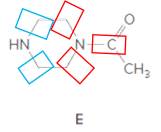
Hence, structure E is a compound that contains a
(d)
Interpretation:
From the given compounds from E to H, a compound containing a tertiary amine and a tertiary amide needs to be identified.
Concept Introduction:
Amine − is an organic N compounds formed by replacing one or more H atoms of
Amide- is an organic compound contains the group of
Answer to Problem 31P
Structure G.
Explanation of Solution
Amines are formed by replacing one or more hydrogen atoms of ammonia with alkyl groups.
Furthermore,
In the below structure, bonds that are indicated in red color are the three
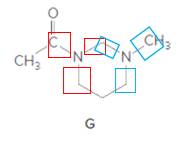
Hence, structure G is a compound that contains a
Want to see more full solutions like this?
Chapter 18 Solutions
Connect One Semester Access Card for General, Organic, & Biological Chemistry
- 2. What is produced when an amine reacts with a strong acid such as HCl? A. An amine and the OH- ion B. An amide and the H+ ion C. An ammonium hydroxide D. An ammonium saltarrow_forwardWhich of the following statements is INCORRECT? a. Amines are electrophilic. Amines are stronger bases than alcohols, ethers, or water. Nitrogen atom is sp³-hybridized and is tetrahedral in shape. Solubility of amines decreases with increasing number of carbons. O b. O C. O d.arrow_forwardMatch the description to one of the compounds E– H. a. a compound that contains a 1 ° amine and a 1 ° amide b. a compound that contains a 1 ° amine and a 2 ° amide c. a compound that contains a 2 ° amine and a 3 ° amide d. a compound that contains a 3 ° amine and a 3 ° amidearrow_forward
- 2. What is produced when an amine reacts with water? A. A primary alcohol and ammonia B. An amide and a hydrogen (H+) ion C. An ammonium ion and a hydroxide (OH-) ion D. An amide and a hydroxide (OH-) ionarrow_forwardErythronolide B is the biological precursor of erythromycin, a broad-spectrum antibiotic. What functional group Erythronolide B does contain? a. b. H₂CH₂C C. H₂C 1 H₂C 2 3 4 O Amide d. Amine OH Erythronolide B Ketone Aldehyde a CH₂ b C d CH₂ OH JCH₂ 'OH OHarrow_forwardA. 1/e/1FAlpQLSfSGcE8gf218c6JoHMWME1A8Nydf8M4g1yG93D-2LPpoMj_g/formResponse Question 24: Which compounds in Figure 24 is both a tertiary amine and a tertiary alcohol? * Compound A O Compound B O Compound C ɔ punodwoɔ a punodwoɔ O O None of these compounds fit the given description. Compound D Figure 24 HO HN N. D. OH HN OH dp 12 SUarrow_forward
- What are the products of the reaction between acetyl chloride and diethylamine? HCl and N,N-diethylacetamide Оа. o b. HCl and diethylamine chloride ос. HCl and N-ethylacetamide d. Diethylacetamide and acidarrow_forwardWhy are tertiary amines not soluble in water? O a. Primary amine cannot hydrogen bond with water. O b. Amines are non polar compounds. O c. Tertiary amine cannot hydrogen bond with water O d. Secondary amine cannot hydrogen bond with water. Clear my choicearrow_forwardArrange the following amines in increasing boiling point. O₂N. NH₂ NH₂ NH₂ A a. Carrow_forwardamine, (2) an amide, or (3) both an amine and an amide. 17-106 Classify each of the following compounds as (1) an amine, (2) an amide, or (3) both an amine and an NH2 b. `NH a. H2N H d. с.arrow_forwardThis compound is mescaline, a hallucinogen. CHO CHO T Which of the following statements is true? Select one: O a. O b. O c. O d. Mescaline is an amine. Mescaline contains an alcohol group. Mescaline is a carboxylic acid. Mescaline is an amine and contains an alcohol group.arrow_forward19. Which of the following molecules contain an amide? H2N-CHC-OH ČH3 a. c. NH2 NH2 b. H2N H2N-CHC-N-CHC-OH d. CHз CH3arrow_forwardarrow_back_iosSEE MORE QUESTIONSarrow_forward_ios
 Chemistry: The Molecular ScienceChemistryISBN:9781285199047Author:John W. Moore, Conrad L. StanitskiPublisher:Cengage Learning
Chemistry: The Molecular ScienceChemistryISBN:9781285199047Author:John W. Moore, Conrad L. StanitskiPublisher:Cengage Learning

